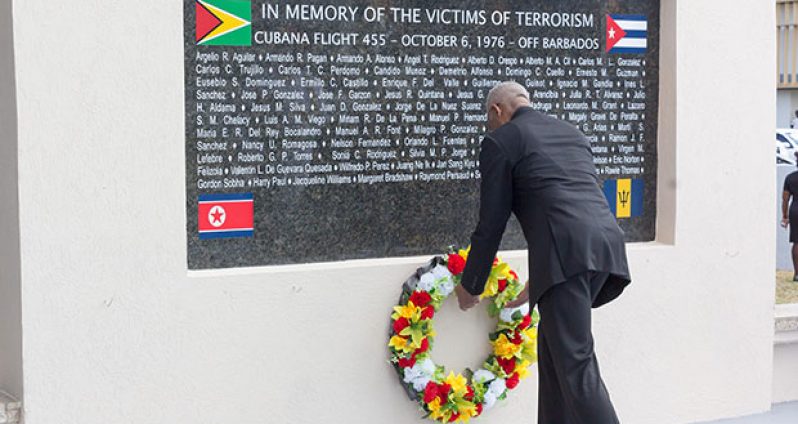Guyana, Cuba remember fallen at moving ceremony
GUYANA reaffirmed its commitment to fostering a zone of peace when a commemorative ceremony was held to mark the 40th Anniversary of the Cubana Air Disaster on Thursday.The ceremony was attended by President David Granger, Cuba’s Ambassador to Guyana Julio César González Marchante, Ministers of Government, Members of Parliament, Chief of Staff of the Guyana Defence Force Brigadier George Lewis and members of the Diplomatic Corps, among others.

Minutes after laying a wreath at the monument erected at the University of Guyana Turkeyen Campus to remember the 73 persons who were killed on board of Cubana 455, President Granger said such an act of terrorism should never re-occur, stating clearly that Guyana “abhors the crime of international terrorism whenever and wherever it occurs.”
On Wednesday October 6, 1976, Cubana Airways Flight CU-455 was scheduled to fly the following route: Guyana to Trinidad, Trinidad to Barbados, Barbados to Jamaica, and finally Kingston to Havana, Cuba. However, at 13:24hrs, nine minutes after it took off from Barbados’ Seawell International Airport (now Grantley Adams Airport) two bombs exploded in the plane causing it to crash into the Atlantic Ocean.
All 48 passengers and 25 crew members were killed – 57 Cubans, 11 Guyanese and five North Koreans. The 11 Guyanese were: Raymond Persaud, Rawle Thomas, Jacqueline Williams, Rita Thomas, Harold Norton, Gordon Sobha, Ann Nelson, Margaret Bradshaw, Violet Thomas, Sabrina Harrypaul and Seshnarine Kumar – all of whom were heading to Cuba to study medicine, engineering and other disciplines.
“We intend that, by remembering the horror of the past at this solemn commemoration, we could spare present and future generations of Caribbean citizens of the recurrence of such transnational crimes,” the President said.
He recalled that the deadly assault on humanity occurred four years after Guyana, Trinidad and Tobago, Barbados and Jamaica had made the “courageous” démarche of establishing diplomatic relations with Cuba.
“The Cubana terrorist attack ensnared the Caribbean Community in a Cold War conflict which was not of the Region’s making. The terrorist attack constituted an assault on the freedom-loving peoples of the Caribbean. It was an attack on the right of the small states of the Region to determine their international relations in their own national interest,” President Granger added.
In December, 2005, during the second CARICOM-Cuba Summit in Barbados, calls were made for the Government of the United States of America to consider favourably, the request for the extradition of the suspect to Venezuela in order to ensure that he is brought to justice on charges of terrorism. Such a move, President Granger noted, would have been in accordance with the U.S. obligations under international law and their own national legislation.
The Cuban Ambassador, in no uncertain way, said “The culprits had proven links with the Central Intelligence Agency of the United States and still enjoy impunity and protection in the territory of that country.”
He said it must be noted that the policy of state terrorism perpetrated against Cuba is responsible for the grief and pain of many Cuban families, the destruction and ravaging of the people’s estate and facilities. As such, he said Cuba has designated October 6 as the Day of Victims of State Terrorism.
“The execution of [a] number criminal acts and sabotage has also been proven as well as the use of mercenaries and not only against Cuba, but also against other countries considered friends of ours. The very Senate of The United States investigated and publicly acknowledged the countless CIA plans to assassinate leaders of the Cuban Revolution and its dedication to this task for several years,” Ambassador Merchante pointed out.
Notwithstanding the many attempts, he gave the assurance that Cuba will continue to condemn and fight terrorism. “May serve this commemoration to reaffirm the unbreakable will of Cuba to fight terrorism, its deepest rejection and condemnation of all acts, methods and practices of terrorism in all its forms and manifestations by whomever, against whoever and wherever they are committed; whatever their motivations are, including those in which States are directly and indirectly involved,” he stated. As such, he said Cuba strongly supports the collective efforts of the United Nations against terrorism.
According to reports, two Venezuelan nationals, Hernán Ricardo Lozano and Freddy Lugo, joined the flight in Trinidad and Tobago. However, they disembarked in Barbados after setting the bombs on the plane. At the time, they were working for Luis Posada Carriles. They were subsequently sentenced to 20 years imprisonment, while Carriles was held for eight years while awaiting a final sentence but eventually fled. He subsequently entered the U.S. where he was held on charges of entering the country illegally and was released on April 19, 2007.











